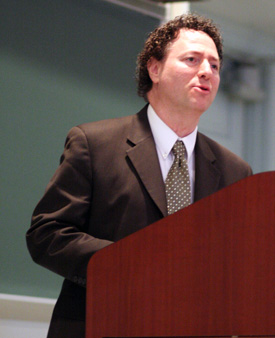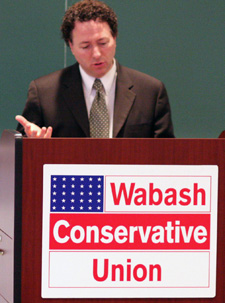At a time in which the impending replacement of several Supreme Court justices looms in the nation’s future, Executive Director for the Committee for Justice Curt Levey spoke out against judicial activism in the courts. "(The Committee for Justice focuses) on what is the proper role of a judge. Should a judge be a neutral umpire or should a judge be an activist?" Levey asked.
 Levey’s Thursday night speech began with an explanation of the Committee for Justice, which was founded in 2002 in response to systematic obstruction of many of President Bush’s judicial nominees, most notably Miguel Estrada. Republicans, Levey explained, needed to respond to this problem. "Conservative activists realized we really needed something to counter the liberal groups on this issue that had been around at least since [blocked Republican justice nominee] Bork and had been very effective," Levey said.
Levey’s Thursday night speech began with an explanation of the Committee for Justice, which was founded in 2002 in response to systematic obstruction of many of President Bush’s judicial nominees, most notably Miguel Estrada. Republicans, Levey explained, needed to respond to this problem. "Conservative activists realized we really needed something to counter the liberal groups on this issue that had been around at least since [blocked Republican justice nominee] Bork and had been very effective," Levey said.
Democrats, Levey said, had filibustered judicial nominees for nearly the entire past eight years until Barack Obama became president and the nominations were dropped. However, despite the partisan nature of the committee, Levey stated the aims of the committee were philosophical as well as practical. "While trying to get Bush’s nominees confirmed, we were also trying to educate people about the proper role of the judge," he said.
The very "role of the judge" is part of what made activism so dangerous. Barack Obama’s statement that he wanted judges who were empathetic to peoples’ situations, Levey explained, destroyed the objectivity that made the law such a useful standard. "One of the problems with (empathy in the law) is that it’s standardless. Who do you have empathy for? And therefore, it’s really just a license for unbridled judicial discretion," Levey said.
He then raised a hypothetical situation to illustrate his point. If, under Obama’s statements, judges were to be sympathetic to both racial minorities as well as the poor, "What if some poor white guy lost his job because Obama’s daughters were hired under a diversity program? Maybe you should rule for the white guy. (Using empathy with the law is( basically just a license to do whatever the hell you feel like doing," Levey said.
Equally importantly, Levey continued, judicial activism is used as a way to enact immediate political changes while circumventing the traditional steps. "The folks who are pushing judicial activism, they are trying to specifically use the courts to achieve political objectives that they know they can’t achieve democratically through legislation or ballot initiatives. They don’t bother going through a five year process in the courts if they think there’s democratic support for it. It is specifically used where they know there’s not democratic support for it."
As he addressed the issue that the constitution must evolve, Levey pointed out that the authors specifically included an amendment process. He cited the process’s "withering," evidenced by the lack of recent amendments. "Up until a few decades ago," Levey said, "we saw a dozen really important constitutional amendments in just about one hundred years."
 Levey eventually shifted away from the theoretical dangers of activism to the immediate future of Barack Obama’s inevitable future Supreme Court Justice selections. While Levey admitted that it was still too early to see how left Obama would be in his nominations, he felt as though the president’s actions and speech would likely diverge. "I think it’s looking like the way he will compromise is to be very moderate in his rhetoric and liberal in his policy and appointment," Levey said. Levey thought Obama would likely choose a Mexican or a woman to fill the next open Supreme Court justice position.
Levey eventually shifted away from the theoretical dangers of activism to the immediate future of Barack Obama’s inevitable future Supreme Court Justice selections. While Levey admitted that it was still too early to see how left Obama would be in his nominations, he felt as though the president’s actions and speech would likely diverge. "I think it’s looking like the way he will compromise is to be very moderate in his rhetoric and liberal in his policy and appointment," Levey said. Levey thought Obama would likely choose a Mexican or a woman to fill the next open Supreme Court justice position.
Ultimately, Levey was most frustrated by a "lack of symmetry" between attempts to block the judicial nominees of both parties. While the Republicans had never before attempted to seriously filibuster even ultra-liberal nominees such as Ruth Bader Ginsburg, the Democrats systematically attempted to block nearly all of Bush’s nominees. Now, Levey said, it is crucial for Republicans to determine the extent of aggressiveness that Republicans senators should use to ensure that moderate judges are selected.
While Levey addressed a potential behind-the-scenes approach to have Republican senators affect the nominations that come from each state, he also mentioned the difficulty of whether or not to seek higher standards for all the judicial positions that were only open now due to the obstruction that occurred during the previous administration.
One member in the audience had an especially interesting connection with Levey. Junior Nick Maraman, the Wabash Conservative Union events coordinator, interned for Levey in the fall semester in Washington D.C. and helped to bring him as a lecturer to Wabash. Maraman felt as though education on judicial activism would be an especially beneficial lecture topic.
"I really took up the cause [of judicial activism] last fall, because I think that judicial activism is a problem and it needs to be righted," Maraman said. "I don’t think that the public understands exactly what it is and what the dangers of it are."
The lecture was sponsored by the Wabash Conservative Union.
Photos by Alex Moseman '11